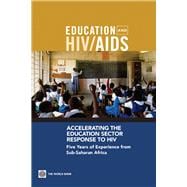
Note: Supplemental materials are not guaranteed with Rental or Used book purchases.
Purchase Benefits
Looking to rent a book? Rent Accelerating the Education Sector Response to HIV Five Years of Experience from Sub-Saharan Africa [ISBN: 9780821379325] for the semester, quarter, and short term or search our site for other textbooks by Bundy, Donald; Patrikios, Anthi; Mannathoko, Changu; Tembon, Andy; Manda, Stella; Sarr, Bachir; Drake, Lesley. Renting a textbook can save you up to 90% from the cost of buying.
| Preface | p. ix |
| Foreword | p. xi |
| Acknowledgments | p. xiii |
| Abbreviations and Acronyms | p. xxiii |
| Overview | p. xxvii |
| Introduction | p. 1 |
| Background to the Accelerate Initiative | p. 3 |
| Goals and Objectives of the Accelerate Initiative | p. 4 |
| Implementation of the Accelerate Initiative | p. 5 |
| The Evolution of the Accelerate Initiative | p. 6 |
| Review of the Accelerate Initiative: Five Years On | p. 7 |
| Promoting Leadership by the Education Sector and Creating Sectoral Demand for a Response to HIV/AIDS | p. 9 |
| Mainstreaming HIV/AIDS in the Education Sector | p. 11 |
| Evaluating the Accelerate Initiative Process | p. 13 |
| Harmonizing Support among Development Partners to Better Assist Countries and Reduce Transaction Costs | p. 15 |
| Promoting Coordination with the National AIDS Authorities and Enhancing Access to AIDS Funds | p. 21 |
| Sharing Information on HIV/AIDS with Specific Relevance to the Education Sector | p. 25 |
| Production of New Documentation Addressing Education Issues from an HIV/AIDS Perspective | p. 26 |
| Promoting Greater Access to a Critical Subset of Existing Information on AIDS and Education | p. 28 |
| Strengthening the Technical Content and Implementation of the Education Sector Response to HIV/AIDS | p. 35 |
| Sector Policy (Including Workplace Policy) | p. 37 |
| Planning and Mitigation | p. 40 |
| Prevention (Including Teacher Training and Life Skills) | p. 43 |
| Ensuring Access to Education for Orphans and Vulnerable Children | p. 46 |
| Conclusions and the Way Forward | p. 49 |
| Education Sector Responses Have Accelerated | p. 50 |
| More Effective Links with Development Partners Are Emerging | p. 50 |
| More and Better Quality Information Is Available | p. 51 |
| Education Sector Responses to HIV Are Now Being Implemented by a Majority of Countries | p. 52 |
| Not All Sectoral HIV Responses Are Mainstream Activities | p. 52 |
| Effective Monitoring and Evaluation Remain a Major Challenge | p. 53 |
| Investment in Regional Coordination and Knowledge Sharing Shows Benefits But Can Be Difficult to Sustain | p. 54 |
| EFA-FTI Processes Are Strengthening HIV/AIDS Responses within the Education Sector Plans | p. 54 |
| Countries of the Southern Cone Have Yet to Engage in the Accelerate Initiative | p. 55 |
| The Future of the Accelerate Initiative | p. 55 |
| Appendixes | p. 57 |
| Chronology of Accelerate Workshops | p. 59 |
| Development Partners Involved in Subregional and National Workshops Held since 2002 | p. 63 |
| Top 20 Distributed Documents to Date | p. 67 |
| Accelerating the Education Sector Response to HIV/AIDS in Africa: A Checklist of Good Practice | p. 69 |
| 2007 Survey Questionnaire | p. 77 |
| References | p. 87 |
| Index | p. 89 |
| Boxes | |
| The UNAIDS Inter-Agency Task Team (IATT) on Education | p. 4 |
| Leadership by the Education Sector within a Federal System: The Case of Nigeria | p. 10 |
| Leadership by the Education Sector within a Small State: The Republic of Burundi | p. 11 |
| Mainstreaming: The Gender Perspective | p. 12 |
| Civil Society's Role in Accelerating the Education Sector Response to HIV/AIDS | p. 16 |
| HIV/AIDS as a Workplace Issue | p. 18 |
| Fostering "Greater Involvement of People Living with HIV/AIDS (GIPA)" in the Accelerate Initiative | p. 20 |
| Accessing NAC Funding in the West Africa Network | p. 22 |
| A Checklist of Good Practice | p. 26 |
| The "Window of Hope" Documentary | p. 27 |
| A Sourcebook of HIV/AIDS Prevention Activities in the Education Sector, Volume II | p. 30 |
| Countries Emerging from Conflict and Fragile States | p. 36 |
| Taking Activities to Scale: Teacher Training in Ghana | p. 36 |
| The Senegalese Experience: School Health, Nutrition, and HIV/AIDS Programming | p. 37 |
| Providing Teachers with Access to Free VCT and ART: A Success Story from Zambia | p. 38 |
| Agreeing on Indicators and Effective M&E Strategies | p. 41 |
| The Ministry of Education HIV/AIDS Focal Point Survey: A Tool for Monitoring Process | p. 43 |
| Developing HIV/AIDS Prevention Curricula in Central Africa | p. 44 |
| Table of Contents provided by Ingram. All Rights Reserved. |
The New copy of this book will include any supplemental materials advertised. Please check the title of the book to determine if it should include any access cards, study guides, lab manuals, CDs, etc.
The Used, Rental and eBook copies of this book are not guaranteed to include any supplemental materials. Typically, only the book itself is included. This is true even if the title states it includes any access cards, study guides, lab manuals, CDs, etc.